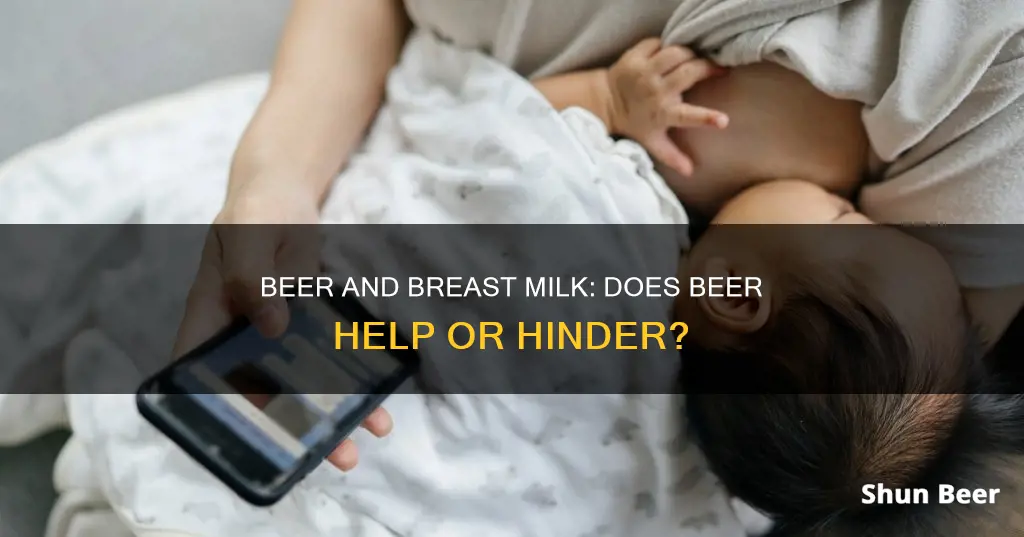
There is a long-held belief that drinking beer can help with breast milk production. This notion has been encouraged in numerous cultures for centuries, with beer even being prescribed to breastfeeding women in the 1960s. While it is true that the barley in beer can boost prolactin, a hormone necessary for milk production, the alcohol in beer decreases milk production and inhibits the milk ejection reflex. As such, there is insufficient proof that drinking beer is safe or effective for increasing breast milk supply.
| Characteristics | Values |
|---|---|
| Can drinking beer help breast milk production? | There is some evidence that the barley in beer can increase the levels of prolactin, the hormone that makes milk. However, alcohol decreases milk production and inhibits the milk ejection reflex. |
| Is it safe to drink beer while breastfeeding? | The CDC recommends breastfeeding mothers avoid alcohol. However, an occasional standard-sized drink (12 oz. of 5% beer) won't be harmful to the baby. |
| What are the alternatives to beer? | Brewer's yeast for lactation, lactation cookies, carrying a manual breast pump at all times. |
What You'll Learn

Barley in beer boosts prolactin production
While there is no magic potion to increase breast milk supply, some foods may help. Barley, a component of beer, may be lactogenic. It is the richest dietary source of beta-glucan, a polysaccharide that has been shown to increase prolactin levels in both humans and animals.
Barley contains starch, dietary fibre such as beta-glucan, and the enzyme diastase. It is a purported galactogogue and is used by mothers in many cultures to increase their milk supply. Galactogogues should never replace evaluation and counselling on modifiable factors that affect milk production.
Animal studies indicate that a polysaccharide found in barley is responsible for an increase in prolactin after beer ingestion. A human study supports some galactogogue activity of barley malt and lemon balm in mothers of preterm infants. In this study, mothers in the barley group produced more milk than the mothers taking a placebo.
The component in beer responsible for the effect on prolactin secretion is not the alcohol content but a polysaccharide from barley, which explains why non-alcoholic beer has the same effect on prolactin.
To use barley to try to increase your breast milk supply, add whole barley to soups, stews, salads, and even risotto. Use barley flakes to make milk or add them to your homemade bread recipe.
Should Teenagers Drink Beer? Exploring the Risks and Regulations
You may want to see also

Alcohol in beer decreases milk production
While it is true that the barley in beer can boost prolactin production, a hormone necessary for milk production, the alcohol component of beer decreases milk production.
Research has shown that babies consumed approximately 20% less breast milk during the first four hours after their mothers had consumed alcohol, despite spending a similar amount of time on the breast. This is due to the inhibitory effect of alcohol on the milk ejection reflex.
A 2018 study showed that 6- and 7-year-old children who had consumed breast milk with alcohol in it as babies didn't score as well on reasoning tests as other children their age who hadn't been exposed to alcohol in their milk.
The Centers for Disease Control and Prevention (CDC) recommends that the safest option while breastfeeding is to avoid consuming alcohol altogether. However, if a breastfeeding mother chooses to drink alcohol, the CDC advises waiting for at least two hours after drinking before nursing or expressing milk. It is important to note that pumping and dumping does not eliminate alcohol from milk faster than the body naturally removes it.
Although the folklore surrounding beer as a galactagogue has persisted for centuries, the presence of alcohol in beer suppresses its potential milk-boosting benefits. Therefore, while non-alcoholic beer may be a safer alternative, it is important to consult with a healthcare professional for personalized advice regarding alcohol consumption while breastfeeding.
Old Beer: Safe to Drink or Not?
You may want to see also

Non-alcoholic beer is a safe alternative
While the American Academy of Pediatrics advises nursing mothers to avoid alcohol consumption, non-alcoholic beer is a safer alternative for breastfeeding mothers. Non-alcoholic beer typically contains less than 0.5% ABV, and its low alcohol content is considered safe for consumption during breastfeeding. However, it is important to remember that every mother's body processes alcohol differently, and it is always advisable to consult a healthcare professional.
Non-alcoholic beer is made using the same ingredients as regular beer, but the alcohol is removed through heating and evaporation. It includes water, malted barley, hops, and yeast as its main ingredients. While there is limited scientific evidence, some reports claim that the barley and hops in beer may positively affect lactation due to their phytoestrogen content, potentially stimulating milk production. However, these claims are not well-substantiated, and safer and more effective methods for increasing breast milk production include frequent breastfeeding, proper hydration, and a balanced diet.
It is worth noting that non-alcoholic beer might contain other ingredients, such as caffeine or artificial sweeteners, which could impact infant health. Therefore, it is recommended that breastfeeding mothers consult their healthcare provider before consuming non-alcoholic beer. The American Academy of Pediatrics suggests that breastfeeding mothers wait for at least two hours after consuming non-alcoholic beer before nursing their infant.
Beer Drinking and Weight Gain: Daily Habit's Impact
You may want to see also

Alcohol passes from mother to baby through breast milk
To minimize the amount of alcohol passing to the baby, it is recommended to wait several hours after drinking before breastfeeding or pumping. For example, the CDC recommends waiting for at least two hours after drinking before nursing or expressing milk. This allows time for the alcohol levels in the breast milk to decrease. If the mother needs to feed the baby before the alcohol has metabolized out of her system, she can feed previously expressed milk.
Excessive alcohol consumption can impact a baby's sleep patterns and growth and development. Short-term effects include impaired REM sleep and increased startling/arousal in the baby. There may also be potential long-term effects on the baby's development, although more research is needed in this area. A 2018 study showed that 6- and 7-year-old children who had been exposed to alcohol in breast milk as babies scored lower on reasoning tests compared to children who had not been exposed.
While drinking in moderation (up to one standard drink per day) is not known to be harmful to the infant, it is important to note that alcohol can decrease milk production due to its effects on the hormone oxytocin. Additionally, infants may dislike the taste of alcohol in the milk, which can lead to reduced milk intake and associated risks. Therefore, it is generally recommended that breastfeeding mothers avoid alcohol consumption, and if they do choose to drink, to consume in moderation and wait several hours before breastfeeding or pumping.
Beer and Medication: A Safe Combination?
You may want to see also

Alcohol can negatively impact a baby's sleep patterns and development
Furthermore, alcohol consumption by the mother can affect the baby's brain development. Acute exposure to alcohol in breast milk has been shown to alter infant sleep patterns, with reduced active sleep and increased sleep disturbances. This may be due to the effects of alcohol on the brain, particularly the suppression of eye and breathing movements during sleep. Prolonged exposure to alcohol in the womb can also lead to permanent changes in the brain's circadian clock, resulting in reduced rhythm amplitude and altered responses to light. These alterations can persist into adulthood, indicating long-term consequences of prenatal alcohol exposure.
Moreover, alcohol can negatively impact the baby's growth and development. It can inhibit the milk ejection reflex, leading to reduced milk intake and decreased milk production over time. Alcohol can also interfere with the release of the hormone oxytocin, which is essential for milk production and letdown. Additionally, the baby may find the taste of alcohol in the milk unappealing, further reducing milk intake.
In summary, alcohol consumption by breastfeeding mothers can have significant negative effects on the baby's sleep patterns and overall development. It is essential to consider the potential risks and long-term consequences when making decisions about alcohol consumption during lactation.
Steel Beer Glasses: Safe Choice?
You may want to see also
Frequently asked questions
The safest option while breastfeeding is to not consume alcohol at all. However, drinking in moderation (i.e. one standard glass of alcohol) while breastfeeding is likely fine, but more research is still needed.
The barley in beer can boost prolactin production, a hormone necessary for milk production. However, the alcohol component of beer decreases milk production and inhibits the milk ejection reflex.
Beer has been prescribed to breastfeeding women as far back as 2000 BC and was marketed in the US as early as the 1800s.
Alternatives to beer include brewer's yeast for lactation, lactation cookies, and carrying a manual breast pump at all times.







